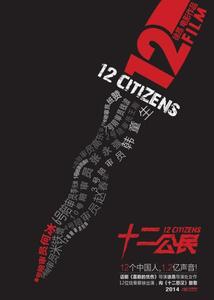

"12 Citizens" poster.
(ECNS) – Twelve jurors debate on whether a young boy accused of killing his father should be sentenced to death in a mock courtroom. The jurors coming from all walks of life include a taxi driver, a millionaire, a teacher, an old man, and an attorney. Different backgrounds and values prompt them to make different judgments in the case.
Sound familiar? It's a Chinese version of the classic "12 Angry Men" called "12 Citizens," directed by Xu Ang, a well-known Chinese stage director. The movie made its debut at this year's Cannes Film Festival.
Xu said he wants to "stir up a conversation" on how Chinese people from different backgrounds view the relationship between individuals and the relationship between individual and society.
The plot is pushed forward by the collision of opinions intensified by the 12 people's range of social backgrounds and personalities. But the story is more about a trial. It's a debate on social problems such as the polarization of wealth, human nature and ethics, as well as legal reforms at a time when China is putting more importance on the rule of law.
Like "12 Angry Men," "12 Citizens" is also notable for its almost exclusive use of one set, a technique referred to by Xu as a style between stage drama and film. He said the purpose is to explore the boundary between fact and fiction.
The movie, including its subject matter, plot, cast and production have garnered much praise from professionals at the festival.
Marco Muller, artistic director of the International Rome Film Festival, said it's the first film ever to depict Chinese society through multiple eyes. Although the film takes its structure from "12 Angry Men," he said it did a nice job of localizing as it explores the many social problems that China faces.
Copyright ©1999-2018
Chinanews.com. All rights reserved.
Reproduction in whole or in part without permission is prohibited.